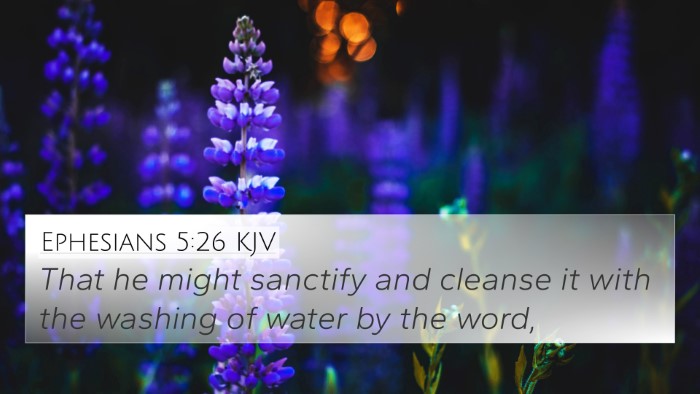Old Testament
Genesis Exodus Leviticus Numbers Deuteronomy Joshua Judges Ruth 1 Samuel 2 Samuel 1 Kings 2 Kings 1 Chronicles 2 Chronicles Ezra Nehemiah Esther Job Psalms Proverbs Ecclesiastes Song of Solomon Isaiah Jeremiah Lamentations Ezekiel Daniel Hosea Joel Amos Obadiah Jonah Micah Nahum Habakkuk Zephaniah Haggai Zechariah MalachiJohn 15:3 Similar Verses
John 15:3 Cross References
Now ye are clean through the word which I have spoken unto you.
Uncover the Rich Themes and Topics of This Bible Verse
Listed below are the Bible themes associated with John 15:3. We invite you to explore each theme to gain deeper insights into the Scriptures.
John 15:3 Cross Reference Verses
This section features a detailed cross-reference designed to enrich your understanding of the Scriptures. Below, you will find carefully selected verses that echo the themes and teachings related to John 15:3 KJV. Click on any image to explore detailed analyses of related Bible verses and uncover deeper theological insights.

John 13:10 (KJV) »
Jesus saith to him, He that is washed needeth not save to wash his feet, but is clean every whit: and ye are clean, but not all.

1 Peter 1:22 (KJV) »
Seeing ye have purified your souls in obeying the truth through the Spirit unto unfeigned love of the brethren, see that ye love one another with a pure heart fervently:
John 15:3 Verse Analysis and Similar Verses
Understanding John 15:3
John 15:3 states: "Now you are clean through the word which I have spoken unto you." This verse is pivotal in the discourse of Jesus about the vine and branches, symbolizing the relationship between Christ and His followers.
Summary of Biblical Meaning
This verse draws an important conclusion about the sanctifying power of Christ's words. The word "clean" signifies a spiritual purity and readiness for the service of God, which comes through understanding and accepting the teachings of Christ. It highlights the transformative effect of divine truth in the life of a believer.
Insights from Commentaries
Matthew Henry's Commentary
Henry emphasizes that the 'word' refers not merely to the teachings but to the entirety of Christ's message, which purifies the believer as one accepts and internalizes these truths. The cleanliness noted here precedes the fruitful life that is expected in the subsequent verses.
Albert Barnes' Commentary
Barnes elaborates on the idea that Jesus's words have a purifying effect akin to spiritual baptism. He discusses the necessity of believers to remain connected to this word for continual purification and growth in faith, indicating that this is foundational for bearing fruit.
Adam Clarke's Commentary
Clarke presents a perspective that reflects on the metaphor of cleansing through the word as a necessary preparation for a fruitful life. He notes that this process is crucial for discipleship and living in accordance with God’s will.
Related Bible Cross-References
- Psalm 119:9: "Wherewithal shall a young man cleanse his way? by taking heed thereto according to thy word."
- Ephesians 5:26: "That he might sanctify and cleanse it with the washing of water by the word."
- 1 Peter 1:22: "Seeing ye have purified your souls in obeying the truth through the Spirit..."
- John 17:17: "Sanctify them through thy truth: thy word is truth."
- James 1:21: "Wherefore lay apart all filthiness and superfluity of naughtiness, and receive with meekness the engrafted word, which is able to save your souls."
- Colossians 3:16: "Let the word of Christ dwell in you richly in all wisdom; teaching and admonishing one another..."
- Hebrews 4:12: "For the word of God is quick, and powerful, and sharper than any twoedged sword..."
- John 8:32: "And ye shall know the truth, and the truth shall make you free."
- Romans 10:17: "So then faith cometh by hearing, and hearing by the word of God."
- 2 Timothy 3:16-17: "All scripture is given by inspiration of God, and is profitable for doctrine, for reproof, for correction, for instruction in righteousness..."
Thematic Connections and Implications
The connection between John 15:3 and the cited verses reveals a rich tapestry of themes revolving around the power of God's word and its role in the believer's life. Each reference emphasizes the necessity of engaging with Scripture for spiritual renewal and growth:
- Purification through the word is a recurring theme, affirming the belief that divine truth brings clarity and cleansing.
- The idea of spiritual fruitfulness is consistently linked with obedience and the internalization of God's teachings.
- These verses illustrate the importance of ongoing relationship with Scripture for sustaining spiritual vitality.
Comparative Analysis of Cross-References
Engaging in a comparative Bible verse analysis allows believers to see not just isolated teachings but the holistic practice of faith:
- John 15:3 emphasizes the initial process of purification, whereas Ephesians 5:26 expands on the continued sanctification through the Holy Spirit.
- 1 Peter 1:22 links the obeying of truth directly to the purification process, reinforcing Jesus's message of cleanliness.
- Each verse calls on believers to actively participate in the learning and application of God's word as a continuous journey towards holiness.
Tools for Bible Cross-Referencing
To fully appreciate the links between these verses, consider employing:
- Bible concordance: Useful for finding specific terms and references within the scriptures.
- Bible cross-reference guide: A systematic way to explore related scriptures.
- Cross-reference Bible study methods: Techniques for delving deeper into the connection between verses.
- Bible reference resources: Tools that provide contextual understanding of verses.
- Bible chain references: Connects one verse directly to another, fostering a deeper understanding.
Conclusion
In conclusion, John 15:3 serves as a profound reminder of the transformative power of Christ's words. Engaging with the Scriptures enables believers to experience the fullness of spiritual life as exemplified in related passages. The act of cross-referencing does not merely enhance comprehension but encourages a dynamic relationship with the divine through the sacred text.




